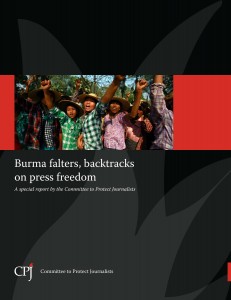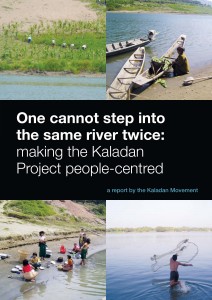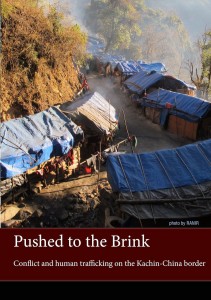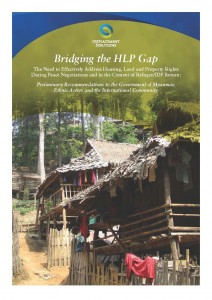Resources (827 found)
Trafficking in Persons Report 2013: Burma
Burma is a source country for men, women, and children subjected to forced labor, and for women and children subjected to sex trafficking in other countries. Many Burmese men, women, and children who migrate for work to Thailand, Malaysia, Indonesia, Singapore, the United States, China, Bangladesh, India, South Korea, and Qatar are subjected to conditions of forced labor or sex trafficking in these countries […]
• • •Bitter Pills: Breaking the Silence Surrounding Drug Problems in the Mon Community
 In late 2012 the New Mon State Party (NMSP) initiated a vigorous anti-drugs campaign throughout various Mon communities in Burma. Arrests of numerous drug smugglers were made, drug-using youth were sent to NMSP rehabilitation centres, and signs were erected in villages calling on residents to resist and combat drug use. This wave of action brought an issue to the table that had thus far been surrounded by silence from relevant authorities. Prior to this, domestic and international discussions of Burma’s drug problems had largely been restricted to regions in Upper Burma, in particular Shan State. However, NMSP action highlighted that drugs were also prevalent in Mon communities and were being abused by Mon youth […]
In late 2012 the New Mon State Party (NMSP) initiated a vigorous anti-drugs campaign throughout various Mon communities in Burma. Arrests of numerous drug smugglers were made, drug-using youth were sent to NMSP rehabilitation centres, and signs were erected in villages calling on residents to resist and combat drug use. This wave of action brought an issue to the table that had thus far been surrounded by silence from relevant authorities. Prior to this, domestic and international discussions of Burma’s drug problems had largely been restricted to regions in Upper Burma, in particular Shan State. However, NMSP action highlighted that drugs were also prevalent in Mon communities and were being abused by Mon youth […]
Resolution on the Situation of Rohingya Muslims
The European Parliament, having regard to its previous resolutions on Burma/Myanmar, in particular those of 20 April 2012[1], 13 September 2012[2] and 22 November 2012[3], having regard to its resolution of 23 May 2013 on reinstatement of Myanmar/Burma’s access to generalised tariff preferences[4], having regard to the EU Foreign Affairs Council conclusions of 22 April 2013 on Myanmar/Burma […]
• • •Burma Falters, Backtracks on Press Freedom
 The media landscape in Burma is more open than ever, as President Thein Sein releases imprisoned journalists and abolishes the former censorship regime. But many threats and obstacles to truly unfettered reporting remain, including restrictive laws held over from the previous military regime. The wider government’s commitment to a more open reporting environment is in doubt […]
The media landscape in Burma is more open than ever, as President Thein Sein releases imprisoned journalists and abolishes the former censorship regime. But many threats and obstacles to truly unfettered reporting remain, including restrictive laws held over from the previous military regime. The wider government’s commitment to a more open reporting environment is in doubt […]
A Tentative Peace in Myanmar’s Kachin Conflict
On 30 May 2013, the Kachin Independence Organisation (KIO) signed a tentative peace agreement with the Myanmar government – the last of the eleven major ethnic armed groups to do so since 2011. This represents a major opportunity to secure lasting peace in Kachin State, and in the country as a whole. Yet, there will be significant challenges in doing so. Key issues still need to be discussed and agreed, including the repositioning of troops from both sides to reduce the chance of clashes, a monitoring mechanism, and a meaningful political dialogue. Major steps need to be taken to develop an equitable peace economy, and the exploitation of Kachin’s significant natural resources, if not appropriately regulated, could compound inequalities and trigger renewed conflict. Much remains to be done to avoid a repeat of the failures of the previous ceasefire process […]
• • •One Cannot Step into the Same River Twice: Making the Kaladan Project People-Centred
 A new report from the Kaladan Movement titled One cannot step into the same river twice: making the Kaladan Project people-centred provides an update on the progress of the Kaladan Project, and assesses the potential Project-related benefits and negative impacts for people living in the project area […]
A new report from the Kaladan Movement titled One cannot step into the same river twice: making the Kaladan Project people-centred provides an update on the progress of the Kaladan Project, and assesses the potential Project-related benefits and negative impacts for people living in the project area […]
Myanmar’s Moment: Unique Opportunities, Major Challenges
Myanmar is a highly unusual but promising prospect for businesses and investors—an underdeveloped economy with many advantages, in the heart of the world’s fastest-growing region. Home to 60 million inhabitants (46 million of working age), this Asian nation has abundant natural resources and is close to a market of half a billion people […]
• • •Pushed to the Brink: Conflict and Human Trafficking on the Kachin-China Border
 On the surface, Burma seems to be strengthening its fight against human trafficking. Burma’s long-held position in the lowest ranking of international trafficking efforts finally inched upwards a rank as a result of several policy reforms and new programs. An anti-trafficking hotline opened, as did several anti-trafficking task force offices. Anti-trafficking stickers and posters are plastered in areas across the country, and American singer Jason Mraz recently teamed with MTV to hold a massive free concert in Rangoon to raise awareness about human trafficking
On the surface, Burma seems to be strengthening its fight against human trafficking. Burma’s long-held position in the lowest ranking of international trafficking efforts finally inched upwards a rank as a result of several policy reforms and new programs. An anti-trafficking hotline opened, as did several anti-trafficking task force offices. Anti-trafficking stickers and posters are plastered in areas across the country, and American singer Jason Mraz recently teamed with MTV to hold a massive free concert in Rangoon to raise awareness about human trafficking
The Kachin Women’s Association – Thailand’s earlier reports Driven Away (2005) and Eastward Bound (2008) had documented the growing incidence of trafficking along the China-Burma border. This new report looks at the impacts of the renewed conflict on this problem […]
A New Dawn for Equitable Growth in Myanmar?: Making the Private Sector Work for Small-Scale Agriculture
A new wave of political reforms have set Myanmar on a road to unprecedented economic expansion, but without targeted policy efforts and regulation to level the playing field, the benefits of new investment will filter down to only a few, leaving small-scale farmers – the backbone of the Myanmar economy […]
• • •Bridging the Housing Land and Property Gap
 Of the many challenging issues that will require resolution within the peace processes currently underway between the government of Myanmar and various ethnic groups in the country, few will be as complex, sensitive and yet vital than the issues comprising housing, land and property (HLP) rights. Viewed in terms of the rights of the sizable internally displaced person (IDP) and refugee populations who will be affected by the eventual peace agreements, and within the broader political reform process, HLP rights will need to form a key part of all of the ongoing moves to secure a sustainable peace, and be a key ingredient within all activities dedicated to ending displacement in Myanmar today […]
Of the many challenging issues that will require resolution within the peace processes currently underway between the government of Myanmar and various ethnic groups in the country, few will be as complex, sensitive and yet vital than the issues comprising housing, land and property (HLP) rights. Viewed in terms of the rights of the sizable internally displaced person (IDP) and refugee populations who will be affected by the eventual peace agreements, and within the broader political reform process, HLP rights will need to form a key part of all of the ongoing moves to secure a sustainable peace, and be a key ingredient within all activities dedicated to ending displacement in Myanmar today […]









 All posts
All posts